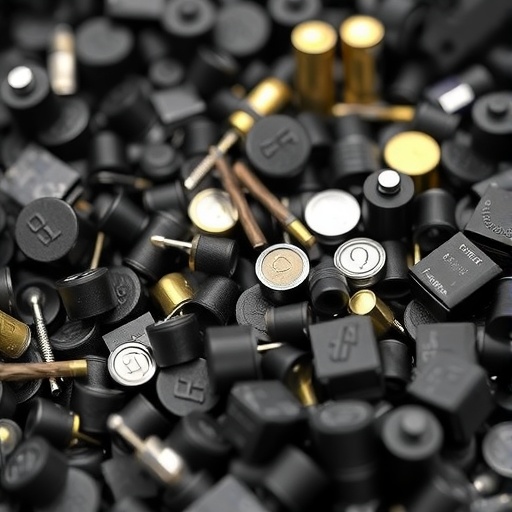In the quest for sustainable technologies, researchers are increasingly focusing on the efficient extraction of critical metals from spent batteries. This topic has gained significant attention as lithium-ion batteries become more prevalent in electric vehicles, portable electronics, and renewable energy storage systems. The paper authored by Sitorus et al. titled “Sustainable leaching of critical metals from lithium-ion battery black mass using a citric acid and choline chloride deep eutectic solvent,” published in Discov Sustain, provides a comprehensive overview of innovative methods that highlight a shift towards more environmentally friendly extraction techniques.
The global demand for lithium, cobalt, nickel, and other critical metals used in battery production is projected to grow exponentially. However, this surge in demand raises several environmental concerns, including the carbon footprint associated with mining these metals and the potential for habitat destruction. The innovative work by Sitorus and colleagues presents a solution to these pressing issues by focusing on a unique sustainable method for leaching metals from battery black mass, an intermediate product derived from recycling lithium-ion batteries.
At the heart of their research is the use of a deep eutectic solvent (DES), specifically a combination of citric acid and choline chloride. This unique solvent system is noted for its ability to solubilize both polar and nonpolar compounds, enhancing the extraction efficiency of metals from complex mixtures. Through their experiments, the authors demonstrate how DES can effectively dissolve metal ions from battery black mass, resulting in high recovery rates without the harsh environmental impacts commonly associated with traditional extraction solvents.
The leaching process using citric acid and choline chloride stands out due to its biocompatibility and minimal toxicity, making it a much more attractive option in terms of environmental safety. Sitorus et al. emphasize that the use of biodegradable solvents can mitigate the chemical hazards typically posed by conventional solvents, promoting a greener approach to metal extraction. This advancement could represent a pivotal turning point for the recycling industry, particularly in how critical metals are retrieved from electronic waste.
Additionally, the research highlights the importance of optimizing various parameters during the leaching process, such as temperature, concentration of the solvent, and reaction time. These factors significantly influence the leaching efficiency and ultimately determine the yield of critical metals from the black mass. The systematic approach taken by Sitorus et al. provides a framework for scaling these methods to industrial applications, with the potential for broader use in recycling facilities worldwide.
Moreover, the implications of this research extend beyond simple metal recovery. By employing a more sustainable method for leaching metals, industries can significantly reduce the environmental impact associated with lithium-ion battery waste. This approach aligns with the increasing demands for sustainable practices across multiple sectors, aiming for a circular economy that emphasizes reuse and recycling rather than disposal.
As global initiatives push for reduced carbon footprints and greater environmental sustainability, the methods described in this research could play a crucial role in transforming the landscape of battery recycling. Policymakers and industry leaders are likely to take note of such sustainable methods as they seek to comply with regulations and corporate sustainability goals. The successful application of these findings could catalyze a new standard in how the industry approaches metal recovery from electronic waste.
This research also encourages further exploration into the chemical properties of deep eutectic solvents and their potential applications. The versatility of these solvent systems suggests that they could be adapted for a variety of extraction processes beyond just battery recycling. The scientific community may see a surge in studies focusing on the wide-ranging potential of DES in various sectors, including pharmaceuticals, food processing, and materials science.
Collaboration across disciplines will be key in advancing the development of these sustainable methods, integrating insights from chemistry, environmental science, engineering, and policy research. The multifaceted nature of this challenge requires a holistic approach, and the groundwork laid by Sitorus et al. serves as a valuable reference point for future innovations. As more researchers contribute to this field, the collective insights could lead to groundbreaking advancements towards a more sustainable future.
Looking ahead, the momentum created by this research could inspire similar studies pursuing alternative methodologies for metal recovery from various forms of waste. By championing the use of renewable resources and sustainable practices, scholars and practitioners alike may carve out pathways to significant environmental benefits while still meeting industrial demands.
The research led by Sitorus et al. not only addresses immediate needs for critical metal recovery but also sets a precedent for how industrial practices can evolve in response to environmental challenges. It captivates the industry’s attention towards finding synergistic relationships between economic growth and responsible environmental stewardship.
With the exploration of deep eutectic solvents leading the charge, potential for innovation and breakthroughs in sustainable technologies remains vast. By nurturing these advancements, we could witness a significant transformation in not just battery recycling, but a broader shift towards sustainability across various industries.
In conclusion, the findings of this study emphasize a promising direction for sustainable practices in metal extraction and recycling. As the world continues to grapple with the repercussions of electronic waste and the necessity for critical resources, research initiatives like that of Sitorus et al. are integral in paving the way for a cleaner, greener, and more sustainable future.
Subject of Research: Sustainable leaching of critical metals from lithium-ion battery black mass using a citric acid and choline chloride deep eutectic solvent.
Article Title: Sustainable leaching of critical metals from lithium ion battery black mass using a citric acid and choline chloride deep eutectic solvent.
Article References:
Sitorus, F., Stromberg, E., Rouquette, L. et al. Sustainable leaching of critical metals from lithium ion battery black mass using a citric acid and choline chloride deep eutectic solvent. Discov Sustain 6, 1298 (2025). https://doi.org/10.1007/s43621-025-02214-5
Image Credits: AI Generated
DOI: https://doi.org/10.1007/s43621-025-02214-5
Keywords: lithium-ion batteries, sustainable practices, metal leaching, deep eutectic solvents, recycling, environmental impact.




